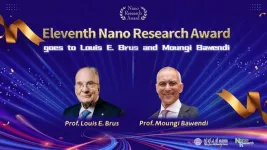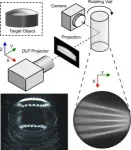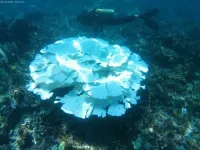Eleventh Nano Research Award goes to Louis E. Brus and Moungi Bawendi
Tsinghua University Press and Springer Nature honor two of the world’s leading experts in nanoscience and nanotechnology
2024-05-09
(Press-News.org)
Recently, Nano Research announced awardees of the 11th Nano Research Award. Two outstanding scientists, Professor Louis E. Brus of Columbia University and Professor Moungi Bawendi of Massachusetts Institute of Technology, have been awarded this honor.
The Nano Research Award, established by the journal Nano Research together with Tsinghua University Press (TUP) and Springer Nature in 2013, aims to recognize outstanding contributions to nano research by an individual scientist. The winner is selected by the Award Committee (the Editors-in-Chief, Associate Editors, representatives from TUP and Springer Nature) after receiving nominations from the members of the Nano Research Editorial Board.
Nano Research is a peer-reviewed interdisciplinary research journal, publishes all aspects of nano science and technology, featured in rapid review and fast publishing, sponsored by Tsinghua University and the Chinese Chemical Society. After 17 years of development, it has become one of the most influential academic journals in the nano field. In 2023 InCites Journal Citation Reports, Nano Research has an Impact Factor of 9.9, the total cites reached 35645, and the number of highly cited papers reached 229, ranking among the top 1.5% of 8786 academic journals.
Professor Louis E. Brus won the Nano Research Award for his pioneering contributions on discovering and analyzing size-dependent quantum effects in colloidal semiconductor nanocrystals (chemical quantum dots) synthesized in liquids. Smaller particles absorbed light that shifted towards blue compared to larger particles. Today, quantum dots are used in a wide range of electronic products, including computer and television screens and LED lamps. They can also be used to map biological tissue. These important discoveries have had wide impact.
Professor Louis E. Brus is currently the Samuel Latham Mitchill Professor Emeritus, and Special Research Scientist at Columbia University. Prof. Brus became an elected fellow of the American Physical Society in 1980 and of the American Academy of Arts and Sciences in 1998, and he was elected to the United States National Academy of Sciences in 2004. He shared the Nobel Prize in Chemistry in 2023 with Moungi Bawendi and Alexy Ekimov. He won the American Chemical Society’s Chemistry of Materials Prize in 2005 and the Kavli Prize in Nanoscience in 2008. Prof. Brus shared the R.W. Wood Prize of the Optical Society of America (OSA, now Optica) with Russian scientists Alexander L. Efros and Alexy Ekimov in 2006 for their work with quantum dots. In addition, Prof. Brus received the National Academy of Sciences Award in Chemical Sciences in 2010 for his ongoing work with nanocrystals. He served as chairman of the Board of Trustees of the Gordon Research Conferences in 1998.
Professor Moungi Bawendi was selected for the award in recognition of his groundbreaking contributions to the production of near-perfect quantum dots of specified sizes and smooth surfaces. The method he pioneered is easy to use and revolutionary. In today's life, quantum dots are used in a wide range of industries, including the field of display technology, photovoltaics and biomedicine. This important discovery has revolutionized human society.
Professor Moungi Bawendi is the Lester Wolfe Professor of Chemistry at MIT. Prof. Bawendi received a Sloan Research Fellowship in 1994, he was elected to the American Academy of Arts and Sciences in 2004, and to the National Academy of Sciences in 2007. He received the Nobel Prize in Chemistry in 2023, the Raymond and Beverly Sackler International Prize in Chemistry in 2001, the Ernest Orlando Lawrence Prize in 2006, and the American Chemical Society (ACS) Award in Colloid Chemistry in 2010.
END
ELSE PRESS RELEASES FROM THIS DATE:
2024-05-09
Among New Yorkers with low incomes, the “Vision Zero” initiative to stem roadway crashes resulted in a marked, 30% reduction in traffic injuries of varying severity from early 2014 – when the city government launched the program – until 2019, according to a new study conducted at New York University.
The study, scheduled for publication May 8 at 4:00 p.m. (ET) in the American Journal of Public Health, revealed this trend of improved safety by comparing Medicaid-covered injury ...
2024-05-09
Suicidality hit new record high in U.S. in 2022
New tool was 92% effective at predicting four variables related to self-harm
AI uses a small set of judgment and contextual variables as opposed to big data, and strongly supports the hypothesis of a standard model of mind
EVANSTON, Ill. --- A new assessment tool that leverages powerful artificial intelligence was able to predict whether participants exhibited suicidal thoughts and behaviors using a quick and simple combination of variables.
Developed by researchers at Northwestern University, the University of Cincinnati (UC), Aristotle ...
2024-05-09
Understanding how genes are regulated at the molecular level is a central challenge in modern biology. This complex mechanism is mainly driven by the interaction between proteins called transcription factors, DNA regulatory regions, and epigenetic modifications – chemical alterations that change chromatin structure. The set of epigenetic modifications of a cell’s genome is referred to as the epigenome.
In a study just published in Nature Genetics, scientists from the Hackett Group at EMBL Rome have developed a modular epigenome editing platform – a system to program epigenetic modifications at any location in the genome. The system allows scientists to study the impact ...
2024-05-09
Aging clocks can measure the biological age of humans with high precision. Biological age can be influenced by environmental factors such as smoking or diet, thus deviating from the chronological age that is calculated using the date of birth. The precision of these aging clocks suggests that the aging process follows a programme. Scientists David Meyer and Professor Dr Björn Schumacher at CECAD, the Cluster of Excellence Cellular Stress Responses in Aging-Associated Diseases of the University of Cologne, have now discovered that aging clocks actually measure the increase in stochastic changes in cells. The study ‘Aging clocks based on accumulating stochastic variation’ ...
2024-05-09
Background and objectives
Wilms tumor is the most common renal malignancy in children. miR-146a, a highly conserved small noncoding RNA, plays a critical role in various human diseases. Increasing studies have suggested that rs2910164 C>G polymorphism in miR-146a is associated with susceptibility to cancers. However, miR-146a rs2910164 C>G polymorphism influence on Wilms tumor remains unknown. The aim of this study was to evaluate the relationship between miR-146a rs2910164 C>G polymorphism and Wilms ...
2024-05-09
BETHESDA, MD. (May 9, 2024) — A simple oral rinse could provide early detection of gastric cancer, the fourth-leading cause of cancer deaths worldwide, according to a study scheduled for presentation at Digestive Disease Week® (DDW) 2024.
“In the cancer world, if you find patients after they've developed cancer, it's a little too late,” said Shruthi Reddy Perati, MD, author and general surgery resident at Rutgers Robert Wood Johnson School of Medicine. “The ideal time to try to prevent ...
2024-05-09
The saturated soil conditions predicted to result from increased rainfall in the UK’s upland regions could have a knock-on effect on the ambition to create more woodland in the fight against climate change, a new study has found.
Researchers from the University of Plymouth have spent a number of years exploring how temperate rainforests could be an effective nature-based solution to some of the planet’s greatest challenges.
They have also shown that the UK’s uplands could in future see significantly more annual rainfall than is currently being predicted in national climate models.
In new research, they found that higher soil water levels within areas such ...
2024-05-09
A new paper in Oxford Open Climate Change, published by Oxford University Press, indicates that extensive bleaching and deaths are widespread at several major coral reefs around the world. This suggests that climate change has resulted in shifting patterns in ocean circulation. Coral reefs may soon be a thing of the past.
Last year, 2023, was the hottest year in recorded history on land and in the oceans, with dramatic and unexpected temperature increases. The highest excess daily air temperatures recorded in 175 countries, as well the most ...
2024-05-09
Citizens are often deeply concerned about how the government manages public finances and taxes. However, understanding government fiscal policy can be complex, leaving citizens without a complete picture of the factors guiding budget decisions. Kyoto City, the ninth most populous city in Japan, has been facing financial difficulties due to declining tax revenues and rising government spending. This has caused citizens to hold negative views about government policies, even though they may not fully understand them.
A study published in the journal International Review of Administrative Sciences ...
2024-05-09
BETHESDA, MD. (May 9, 2024) — A new weight-loss treatment could be on the horizon with an innovative endoscopic procedure that ablates (burns) the stomach lining to reduce production of ghrelin, a hormone that triggers hunger, resulting in decreased appetite and significant weight loss, according to a first-in-human trial to be presented at Digestive Disease Week® (DDW) 2024.
The six-month trial involving 10 female patients with obesity resulted in a 7.7% loss of body weight and a reduction of more than 40% in fasting ghrelin levels. Patients reported through validated questionnaires that their hunger was diminished by more than a third. The procedure also caused a 42% reduction ...
LAST 30 PRESS RELEASES:
[Press-News.org] Eleventh Nano Research Award goes to Louis E. Brus and Moungi Bawendi
Tsinghua University Press and Springer Nature honor two of the world’s leading experts in nanoscience and nanotechnology






